新概念英语第三册名词性从句课件(共70张PPT)
文档属性
| 名称 | 新概念英语第三册名词性从句课件(共70张PPT) |

|
|
| 格式 | pptx | ||
| 文件大小 | 3.5MB | ||
| 资源类型 | 教案 | ||
| 版本资源 | 新概念英语 | ||
| 科目 | 英语 | ||
| 更新时间 | 2023-10-05 18:23:26 | ||
图片预览

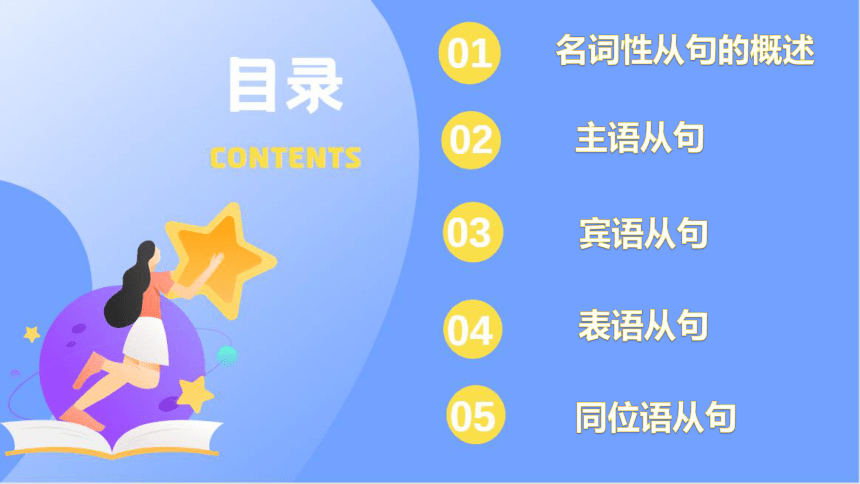
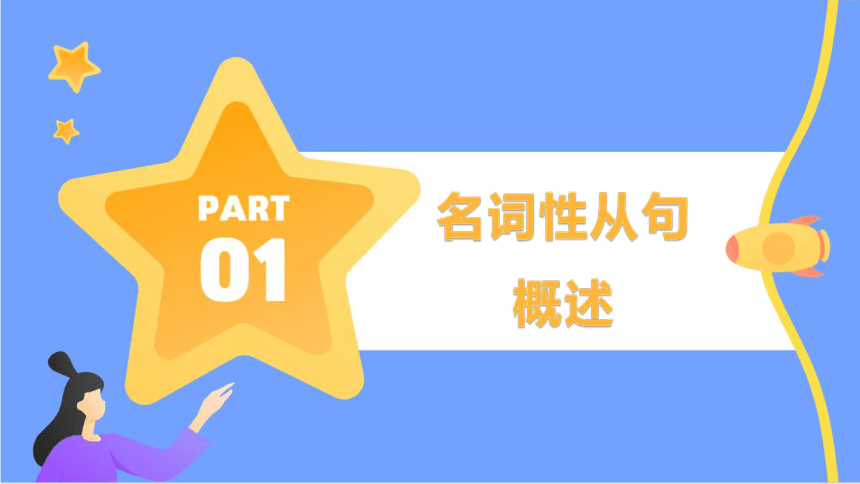
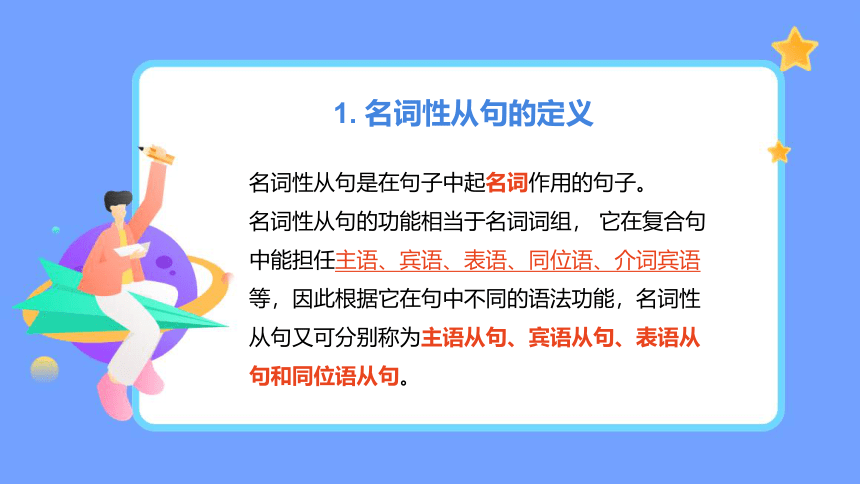
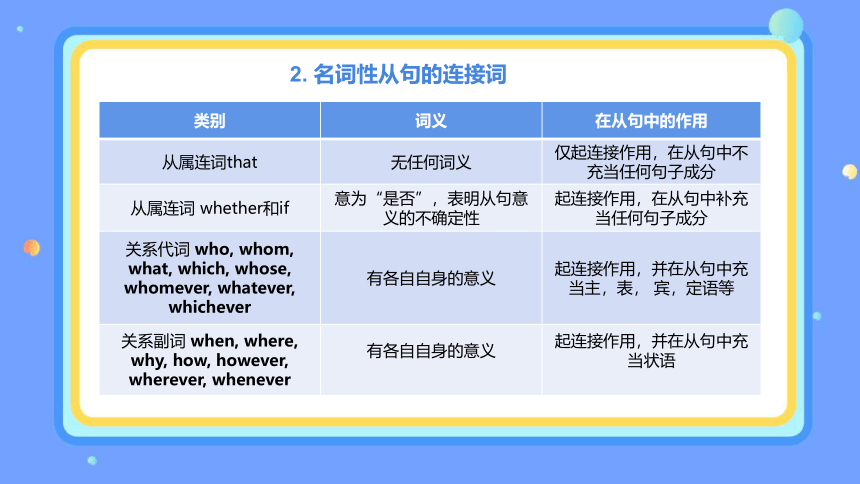

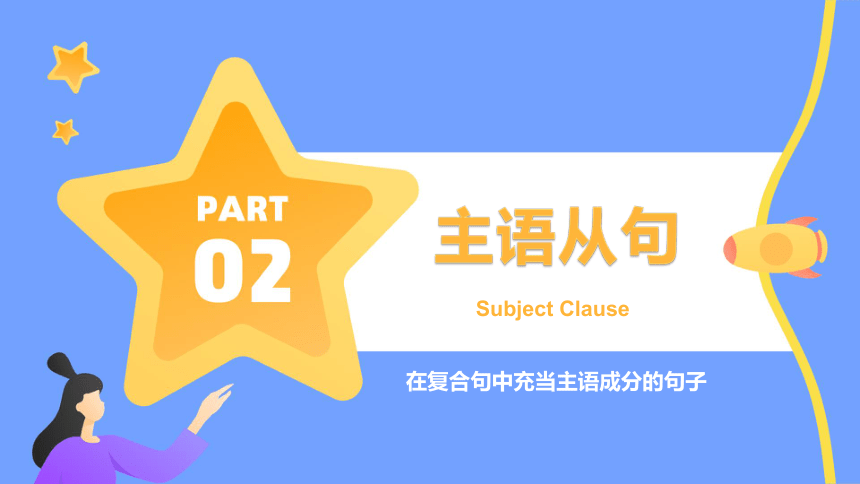
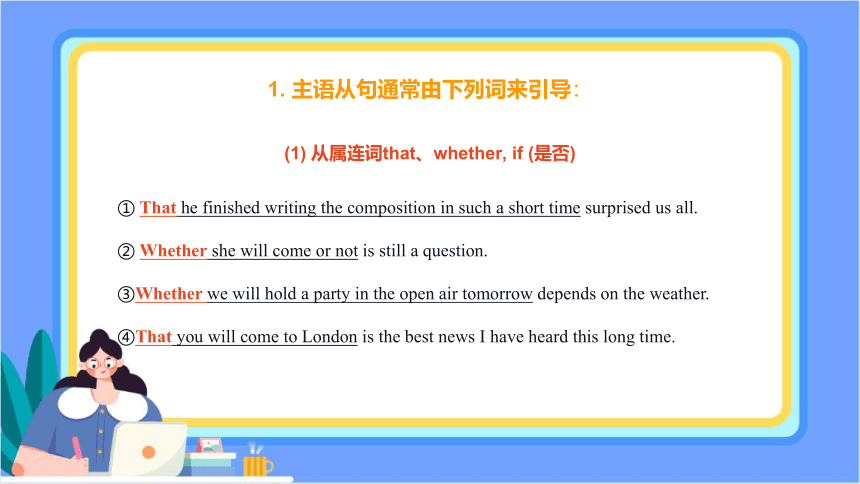
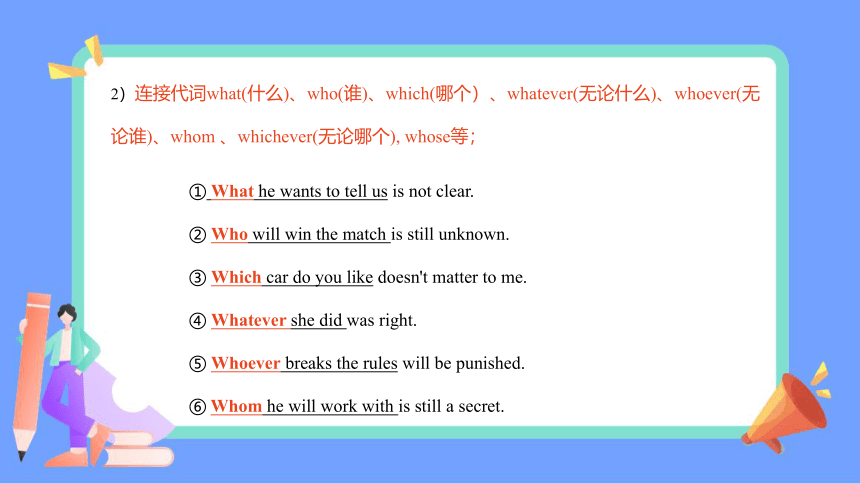

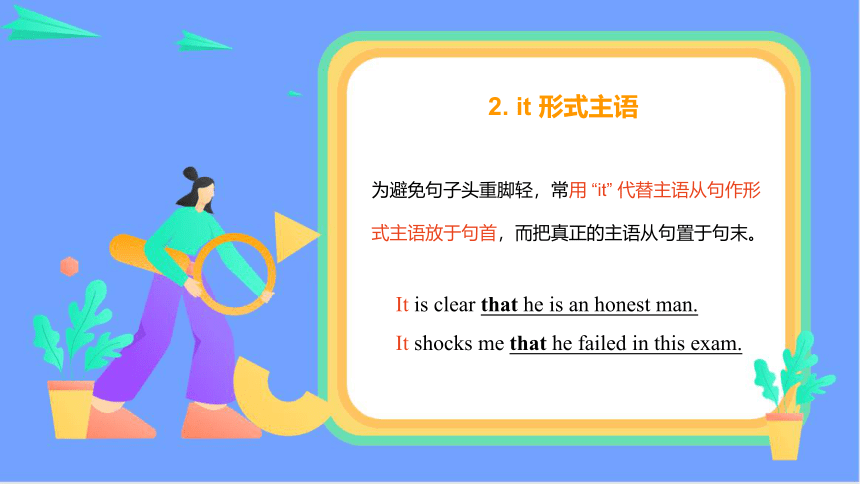
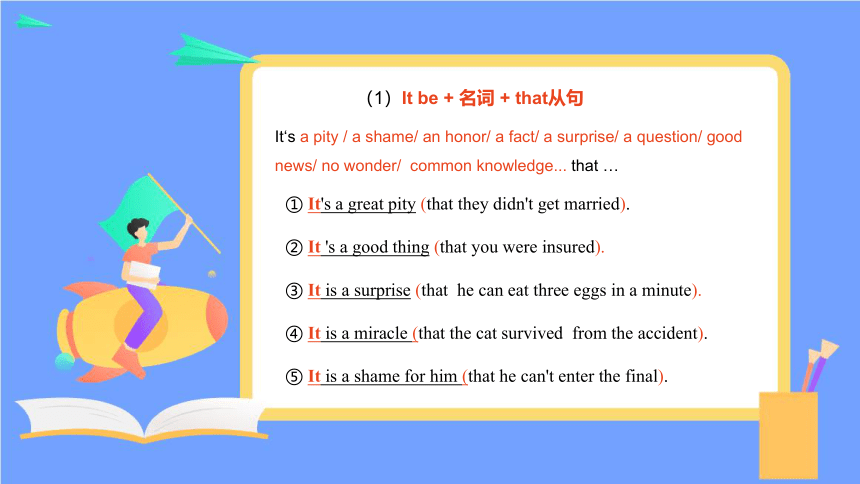
文档简介
(共70张PPT)
名词性从句
Noun clause
名词性从句的概述
主语从句
宾语从句
同位语从句
表语从句
名词性从句
概述
名词性从句是在句子中起名词作用的句子。
名词性从句的功能相当于名词词组, 它在复合句中能担任主语、宾语、表语、同位语、介词宾语等,因此根据它在句中不同的语法功能,名词性从句又可分别称为主语从句、宾语从句、表语从句和同位语从句。
1. 名词性从句的定义
类别 词义 在从句中的作用
从属连词that 无任何词义 仅起连接作用,在从句中不充当任何句子成分
从属连词 whether和if 意为“是否”,表明从句意义的不确定性 起连接作用,在从句中补充当任何句子成分
关系代词 who, whom, what, which, whose, whomever, whatever, whichever 有各自自身的意义 起连接作用,并在从句中充当主,表, 宾,定语等
关系副词 when, where, why, how, however, wherever, whenever 有各自自身的意义 起连接作用,并在从句中充当状语
2. 名词性从句的连接词
(1) that 本身无意义, 引导单一的宾语从句时that常可省略,但引导主语从句、表语从句、同位语从句时that通常不能省略。
(2)介词后的连词。
(3)引导主语从句和同位语从句的连词不可省略。
That she was chosen made us very happy.
We heard the news that our team had won.
(4)在从句中做成分的连词.
3. 连接词使用
主语从句
在复合句中充当主语成分的句子
Subject Clause
1. 主语从句通常由下列词来引导:
(1) 从属连词that、whether, if (是否)
① That he finished writing the composition in such a short time surprised us all.
② Whether she will come or not is still a question.
③Whether we will hold a party in the open air tomorrow depends on the weather.
④That you will come to London is the best news I have heard this long time.
① What he wants to tell us is not clear.
② Who will win the match is still unknown.
③ Which car do you like doesn't matter to me.
④ Whatever she did was right.
⑤ Whoever breaks the rules will be punished.
⑥ Whom he will work with is still a secret.
2)连接代词what(什么)、who(谁)、which(哪个)、whatever(无论什么)、whoever(无论谁)、whom 、whichever(无论哪个), whose等;
3) 连接副词how(怎样)、when(什么时候)、where(哪里)、why(为什么)等。
① Where her birthday party will be held has not yet been announced.
② How I solve this problem depends on your attitude.
③Why dinosaurs died out remains a puzzle.
④When they will go to America has not been decided yet.
2. it 形式主语
为避免句子头重脚轻,常用 “it” 代替主语从句作形式主语放于句首,而把真正的主语从句置于句末。
It is clear that he is an honest man.
It shocks me that he failed in this exam.
(1)It be + 名词 + that从句
① It's a great pity (that they didn't get married).
② It 's a good thing (that you were insured).
③ It is a surprise (that he can eat three eggs in a minute).
④ It is a miracle (that the cat survived from the accident).
⑤ It is a shame for him (that he can't enter the final).
It‘s a pity / a shame/ an honor/ a fact/ a surprise/ a question/ good news/ no wonder/ common knowledge... that …
(2)It + be + 形容词 + that- 从句
It’s impossible/ possible/ probable/ important/ necessary/ fortunate/ certain/ clear/ obvious / likely/ natural/ strange/ true / surprising/funny... that …
① It's splendid (that you passed your exam).
② It's strange (that there are no lights on).
③ It is true (that he won the match).
④ It was surprising (that she passed the difficult exam).
(3)It + be + 过去分词 + that- 从句
It’s said/ reported/ believed/ thought/ announced/ decided/ known to all / must be pointed out/ must be admitted...that…
It is reported that the number of wild animals in Africa is decreasing.
It’s announced that the hostages have been released.
It’s decided that the meeting has been put off till next Monday.
It’s known to us how he became a writer.
(4) It+ 不及物动词(短语)(seem/ happen/ appear/ look/ occur/ turn out)+that从句……
① It seems that you object the plan.
② It happened that I had been out when he called.
③ It has just occured to me that there is still another possibility to ensure a prompt delivery of the goods.
④ It turned out that this method doesn't work well.
* 常将 seem, appear 等后的从句的否定转移到前面。
It doesn't seem that they know where to go.
* seem的五种用法
①.sb seems (to be)+adj./n./prep.
She seems (to be) quite happy.
You don’t seem to be quite yourself today.
②.sb seems to do
She seems to know the secret.
I seem to have seen him somewhere before.
③.it seems that …
It seems that she is quite happy.
It seems to be years since I last saw you.
④.sb/sth seems as if ….
It seems as if it is going to rain.
He seems as if he has known the news.
⑤.there seem(s) to be …
There seems to be a small pine on the top of the hill.
There seems to be no need to go now.
* it 为形式主语,that引导真正主语从句中的虚拟语气
(1) 在形容词为: natural/important/ necessary/strange/ essential/ dispensable / vital/ imperative等时, that 引导的从句中的谓语动词形式常用 (should) +动词原形表示。
It was necessary that we (should) make everything ready ahead of time.
It is vital that every student (should) be able to understand the rule of school.
It is important that everyone (should) be present at the meeting on time
(2) 如果过去分词或名词是suggested/ ordered/ required/ advised/ requested/ insisted/demanded/ requirement/ suggestion / order /proposal 等表示建议、要求、命令等词时,that引导的从句应该用虚拟语气,其谓语动词的结构为:(should)+动词原形。
It's suggested that students (should) make their bed by themselves.
It’s required that students (should) have a physical examination before entering the school.
It is my proposal that he (should) be sent to study further abroad.
3.主语从句的主谓一致问题
(1) 单个的主语从句作主语 ,谓语动词用单数;
如果两个或两个以上的主语从句作主语 ,谓语动词用复数。
When he was born hasn’t been found.
How and why he came to the lonely small island is still a mystery.
When the person was murdered and why he was murdered are still unknown.
When they will start and where they go have not been decided yet.
(2) what 引导的主语从句 ,谓语动词单复数可由表语来决定。
What we need are women workers.
What we need is more time and money.
3.主语从句的主谓一致问题
宾语从句
复合从句中充当宾语成分的句子
Object Clause
01
定义与分类
1. 宾语从句的定义
在复合句中,置于动词、介词等词性后面起宾语作用的从句叫宾语从句。 宾语从句的语序必须是陈述语序。
简单句
I
know
him
复合句
I
know
who he is
↑
↑
↑
↓
主语
谓语
宾语
↓
主句
宾语从句
2.宾语从句的分类
(1)主句的谓语动词之后可以跟宾语从句,常用的动词如下:
say, think, insist, wish, hope, demand, imagine, wonder, know, suppose, see, believe, agree, admit, deny, expect, explain, order, command, feel, dream, suggest, hear, mean, notice, prefer, request, require, propose, declare, report等
I must say that you have good taste.
I don’t understand what he wants to express.
Don’t you know that Mary will go to Shanghai next week
I have heard that he has been married before.
I'll ask if it's all right to park here.
(2)有些形容词后也可以带有宾语从句, 比如:afraid, sure, anxious,aware,certain,confident,glad, proud,sorry等
I’m afraid that you can’t find him in that park.
We are not sure whether/if we can persuade him out of smoking.
I felt absolutely certain that I'd seen her before.
We are pleased that the problems have been resolved.
*当be sure引导主句是肯定句时,后面的名词性从句的连接词常用that; 当be sure引导的主句是否定句时,后面的名词性从句的连接词常用whether或if.
①一般介词后只跟wh-词引导的宾语从句(即特殊疑问词、特殊疑问词-ever以及whether)
I am surprised at what he said.
The new book is about how the manned spaceship was sent up into space.
He was not conscious of what a big mistake he had made.
It depends on what you choose and how many you want.
②介词后如果接that从句,要先加上it, 再加that从句,即“介词+it+that…”结构。
You may depend on it that they will support you. (that不能省略)
You can rely on it that I will keep your secret.
(3)宾语从句也可以跟着介词后面
③介词except(除了), but, besides及in后可接that从句(that不可省略)。
I know nothing about him except that he lives here.
This essay is good except / but that the handwriting looks a bit terrible.
I was lucky in that I was able to find a good job.
It is not a good plant for your garden in that its seeds are poisonous.
1). 由连接词 that 引导宾语从句时,that在句中不担任任何成分,在口语或非正式的文体中常被省去,引导并列句时,that不可省略。
① He has told me (that) he will go to Shanghai tomorrow.
② I am glad (that) you can join us.
③ She says (that) she won’t take part in the sports meeting next Sunday.
④Most people believe (that) honesty plays an important role in interpersonal communication.
⑤ He told me that he had two sons and that they both had gone to college.
2.1 由从属连词引导的宾语从句
02.连接词
* 注意:在demand、order、suggest、decide、insist, desire, request, command, doubt等表示要求、命令、建议、决定等意义的动词后,宾语从句的谓语动词常用“(should)+ 动词原形”
I insist that she (should) do her work alone.
He suggest that we (should) invite Jim to join this party.
The commander ordered that troops (should) set off at once.
(2). 当宾语从句是一般疑问句时,由连词whether 或if引导(口语中常用if),因为if/ whether 翻译成: “是否”,具有一定的意义,所以不能省略。
Lily wanted to know if /whether her grandma liked the handbag.
Let’s see if /whether we can find out some information about that city.
It all depends on whether she wants to go outside or not.
用 who、whom、what、which、whose、whoever、whomever、whatever、whichever 等引导的宾语从句相当于特殊疑问句,应注意句子语序要用陈述语序。
I want to know what he has told you.
She always thinks of how she can work well.
She will give whoever needs help a warm support.
I am so curious about which country you want to live in.
I wonder who is responsible for the accident.
2.3 由连接代词引导的宾语从句
2.4 由连接副词引导的宾语从句
where, when, why, how等连接副词引导宾语从句,也要陈述句的语序。
Do you know where he lives
Please let me know how you will solve this problem.
They didn’t tell me when the party started.
Could you tell us how long the meeting will last
02
时态问题
2.1 如果主句是现在的时态 (包括一般现在时 ,现在进行时,现在完成时),从句的时态可根据实际情况而定,(包括一般现在时,一般过去时,一般将来时,现在完成时等)
I know (that)he lives here .
I know (that) he lived here ten years ago .
I have heard (that) he will come tomorrow .
2.2.如果主句是过去的时态(包括一般过去时,过去进行时),那么从句的时态一定要用相对应的过去的某种时态(包括一般过去时,过去进行时,过去将来时, 过去完成时)
I knew who lived here.
She told me that she was talking with her mother at that time last week.
He asked whether his father would come back the next day.
He said that he had seen it before.
2.3 当从句是客观真理,定义,公理,定理时用一般现在时。
The teacher said that the sun travels
around the earth .
The teacher said that the world is made up of matter.
3. it 做形式宾语,将真正宾语从句后置的情况
(1). 动词 find, feel, think, consider, make, believe 等后面有宾语补足语的时候,则需要用 it 做形式宾语而将 that 引导的宾语从句后置 .
“主语+动词+it+宾语补足语+that从句... ”
I think it necessary that we take plenty of hot water every day .
He felt it difficult that Alice finish so much work in one day.
Machines make it possible that people do more work with less energy.
(2). 有些动词带宾语从句时需要在宾语从句前加 it, 这类动词主要有 : appreciate, enjoy, like, dislike, love, hate, prefer, take, have, put 等.
“主语+动词+it+宾语从句...”
I don’t like it that he is that lazy.
I appreciate it if you help me with my English.
I hate it when people talk with their mouth full of food.
She really enjoy it when the patients come to see her after they recover.
(3) 用于“动词+介词(短语)+it + that 从句”,常见于answer for(保证), depend on, rely on, insist on(坚持,强调), look to(寄望), see to(保证), stick to(坚持), count on(指望)等结构中。
You may depend on it that Tom will help you with your English.
I can’t answer for it that he will help you.
You can count on it that he is very smart.
You should see to it that such things won't happen.
(4)用于 “动词 +宾语 +介词短语 ”的句型中.
Keep it in mind that you have to be home by ten o’clock .
He took it for granted that he would be admitted into Peking University.
4. 名词性从句的注意事项
4.1 用whether或if引导的宾语从句,其主语和谓语的顺序也不能颠倒,仍保持陈述句语序。
此外,whether与if 在作“是否”的意思讲时,常放在动词know, ask, care, wonder, find out等之后引导宾语从句,不过在下列情况下一般只能用whether,不用if 。
(1) whether引导主语从句在句首时;
Whether there is life on the moon is an interesting question.
Whether he can come to the party on time depends on the traffic.
(2) 宾语从句放在句首表示强调时,只能用whether;
Whether this is true or not, I really don't know.
(3) 引导表语从句与同位语从句时,只能用whether;
The question is whether we can get in touch with her.
The question whether we should call in a specialist was answered by the family doctor
(4)引导介词宾语时, 只能用whether;
His father is worried about whether he lose his work.
I'm thinking about whether I should quit my present job.
Everything depends on whether we have enough money.
(5)if与whether都可以与or not连用,但后面紧跟着or not时只能用whether;
We didn't know whether or not she was ready.(此时只能用whether)
I wonder whether/if the news is true or not.(此时则二者都可以用)
(6) 在不定式前只能用whether
I didn’t decide whether to go or not.
4.2宾语从句的否定转移
当主句的谓语动词是 think, believe, imagine, suppose, consider, expect 等,并且主句的主语须是第一人称而且为一般现在时 ,从句的否定词一般要转移到主句上来 ,其反义疑问句一般与宾语从句一致 .
I don’t think he will come to my party.
We don’t believe she can do it better, can she
I can’t imagine what her life will be without money.
①当一个谓语动词带两个或两个以上的 that 引导的宾语从句时 ,第一个可以省后几个不能省略.
He said (that) the book was very interesting and that( 不省略 ) all the children like to read it.
②that 宾语从句的状语部分位于从句之前时 .
I promised that if anyone could set me free, I would make him king over the earth.
③宾语从句的主语是非谓语动词或主语从句时 .
The old lady then explained that what she was looking for was a pair of gloves for a girl.
4.3宾语从句中 that 不能省略的9种情况
④有间接宾语时
He told me that he was leaving for Japan.
⑤在 “it(形式宾语 )+补语 ”之后时
I think it necessary that he should stay here.
⑥宾语从句与动词被其他词 , 插入语或从句隔开时
They told us once again that the situation was serious.
We hope, on the contrary, that he will stay at home with us.
When he got to England, he found, however, that his English was too limited.
⑦that 从句单独回答问题时。
—What did he hear —That Kate had passed the exam.
⑧that引导的从句位于句首时
That our team will win, I believe.
⑨在 except, but, in 等介词后, 其它一些介词的宾语从句, 如由连词 that 引导 ,则需用 it 先行一步 ,作形式宾语
He has no special fault except that he smokes too much
See to it that children don’t catch cold.
( ) 1. It's so dark. I can't find out ______ it's a boy _______ a girl.
A. if, and B. that, and C. either, or D. whether, or
( ) 2. He told me _______ she would catch the early bus.
A. which B. whether C. if D. that
( ) 3. Mrs. Green asked me_______ I would go with her.
A. what B. which C. why D. that
( ) 4. We consider it impossible _______ they could know how to operate a computer.
A. what B. which C. why D. that
( ) 5. I don't know _______ the coat _______ cheap enough.
A. if, is B. where,were C. that ,was D. if, were
D
A
C
D
D
表语从句
在复合句中,位于系动词之后作表语的从句叫表语从句。
Predicative Clause
01
定义与结构
表语是用来说明主语的身份、性质、品性、特征和状态的。
表语常由名词、形容词、副词、介词短语、不定式、动词的-ing、从句来充当,它常位于系动词(be, become, appear, seem, look, sound, feel, get, smell等词)之后。
This is what he said.
Her wish is to become a singer.
That remains a puzzle to me.
This
is
a garden
where he stayed
This
is
↑
↓
↑
↑
主语
表语
系动词
表语从句
简单句
复合句
在复合句中,位于系动词之后作表语的从句叫表语从句。引导表语从句的关联词与引导主语从句的关联词大致一样,表语从句位于系动词后,有时用as if引导。
主语+连系动词+句子作表语(表语从句)
(1).that 引导表语从句,无词义,只起连接作用,不可省。
(2).系动词可为be, look, seem, sound, appear等。
(3).主语可为名词fact, truth, cause, question, explanation, trouble, assumption, belief等,代词this, that, these, it等。
2.
构成要素
The trouble is that I have lost his address.
The question is whether we will go for an outing tomorrow.
This is how they overcome the difficulties.
It is just because he doesn't know her.
It appears that there has been a mistake.
3. 连接词
(1)由从属连词 that, whether 引导的表语从句,that 不可省略
The problem is that millions of people die of illnesses caused by smoking.
The question is whether it is worth doing.
What impressed me most is that he was not afraid of difficulties.
All she's worried about is whether he is all right.
翻译:
The question is whether you will support me.
1.问题在于你是否会支持我。
2.他的意思是你应该把门打开。
What he means is that you should open the door.
(2) 由关系代词 who, whom, which ,what, whose 等引导的表语从句。
What I want to know is which road we should take.
The question is who should be responsible for this accident.
This is what I want to express.
What I want to know is whose wallet has been lost.
我想知道谁的钱包丢了
(3)由关系副词 when, where, why, how 等引导的表语从句 .
That is where I can’t agree with you.
The question is why he came here.
All I want to know is how he improves his spoken English.
The question is when he can arrive at the hotel.
医院在这
This is where the hospital is.
问题是他怎么知道答案的
The problem is how he knows the answer.
4.表语从句的特殊引导词 because, why, as if/though 及句型 the reason why/ for… is that…
It is because I love you too much.
That is why I failed the exam.
It looks as if it is going to rain.
The reason why he was dismissed is that he didn’t work hard.
She seems as if she had done a great thing.
他今天没有来学校是因为他生病了
The reason why he didn’t come to shcool is that he was ill.
“That is why...”是常用句型, 意为“这就是……的原因/因此……”, 其中why引导的名词性从句在句中作表语, 该句型通常用于针对前面已经说明过的原因进行总结。
That is why I came here.
That is why you can find the cat in the box.
* 补充:
(1)“That is why...”与“That is the reason why...”同义, 只不过从语法结构上讲, “That is the reason why...”中why引导的是—个定语从句, 将其中的the reason去掉则与“That is why...”结构一样 。
That is (the reason) why I cannot agree.
That is (the reason) why he pays more attention to English education.
That's (the reason) why I'm so happy to go to the movies with him.
(2)“That is because...”与“That is why...”之间的不同在于“That is because...”指原因或理由, “That is why...”则指由于各种原因所造成的后果。
He did not see the film last night. That is because he had to help his little sister with her homework.
He had seen the film before. That is why he did not see it last night.
前面是结果,后面是原因
前面是原因,后面是结果
1. You are saying that everyone should be equal, and this is ____ I disagree.
A. why B. where C. when D. how
2. — I drove to Zhuhai for the air show last week.
— Is that ____ you had a few days off
A. why B. when C. what D. where
3. ____ she couldnn’t understand was ____ fewer and fewer students showed interest in her lessons.
A. What; why B. That; what C. What; because D. Why; that
4._____made the school proud was ____ more than 90% of the students had been admitted to key universities.
A. What; because B. What; that C. That; what D. That; because
练一练
B
A
A
B
同位语从句
同位语从句指在复合句中充当同位语的从句
appositive clause
01. 同位语从句的定义
同位语从句用来对其前面的抽象名词进行解释说明(即被解释说明的词=同位语)。同位语从句即重复说明同一个称谓或事件的从句。
I‘ve come from Mr Wang with a message that he can't visit you this afternoon.
This is a fact that smoking is a danger to health.
Messengers brought news that the battle had been lost.
(1) 同位语从句一般跟在抽象名词 fact, idea, news, word, rumor, hope, belief, thought,truth, theory, doubt, suggestion, proposal, possibility, warning, instruction, reason, information, message, story, question, order, demand, wish, doubt, statement 等之后,对这些名词的具体内容进行说明或解释。
02. 同位语从句的用法
We heard the news that our team had won.
They were worried over the fact that you were sick.
The message that we are having a holiday tomorrow is sent to them. The question whether it is right or wrong depends on the result.
【注意1】在某些名词,如:demand, suggestion, requirement, wish, resolution, proposal等 词后面的同位语从句要用虚拟语气,即同位语从句的谓语动词形式为 “should+动词原型”(should 可省略)
There was a suggestion that Brown should be dropped from the team.
Your requirement that she should wait till next week is reasonable.
The resolution that women be allowed to join the society was carried
【注意2】引导同位语从句的连词that通常不省略,但在非正式文体中也可以省去。
【注意3】在名词 doubt“怀疑”后的同位语从句用whether连接;在no doubt“不怀疑”之后的同位语从句用that连接。
We have some doubt whether they can complete the task on time.
There is no doubt that he will keep his promise.
(2)引导同位语从句的词除连词 that, whether 外,还有连接代词 what, which, who, 以及连接副词 how,when,where,why 等。(注:if 不能引导同位语从句。)
The fact that we lack enough funds needs to be considered.
There is some doubt whether he will come.
The question who should be the first has not been settled.
They’re still discussing the matter when we’ll hold the sports meeting.
Have you any idea what time it starts
有时同位语从句能够和同位的名词分开.
The story goes that he beats his wife.
The news got about that he had won a car in the lottery.
The rumour spread that a new school would be built here.
Report has it that the Smiths are leaving town.
The thought came to him that maybe the enemy had fled the city.
The order soon came that all citizens should evacuate the village.
03. 分离同位语从句
04. 同位语从句与定语从句的区别
1. 从词类上区别
同位语从句前面的名词只能是idea,fact,news,hope,belief,suggestion,proposal,word,thought,doubt,truth,possibility,promise,order等有必须内涵的名词;而定语从句的先行词能够是名词,代词,主句的一部分或是整个主句。
Word came that he had been abroad.
Our team has won the game, which made us very happy.
The doctor whom you are looking for is in the room.
The idea that one can do the work without thinking is wrong.
His mother did all she could to help him with his study.
同位语从句
定语从句
同位语从句
定语从句
定语从句
2. 从性质上区别
同位语从句是从句对前面抽象名词的进一步的说明和解释,属于名词性从句的范畴; 而定语从句是从句对其先行词的修饰或限制,属于形容词性从句的范畴。
The news that our team has won the game was true.
The news that he told me yesterday was true.
I made a promise that if anyone set me free I would make him very rich.
The mother made a promise that pleased all her children.
同位语从句
同位语从句
定语从句
定语从句
3. 从引导词及其在句子中的成分上区别
(1)有些引导词如how, whether, what能够引导同位语从句,但不能引导定语从句。
(2)引导词that引导定语从句时,在从句中一般作主语或宾语(指物时还能够用which代替),并且作宾语时常常省略; 但是,that在同位语从句中仅起连接作用,不充当任何成分,并且不能省略,也不能用which来代替。
The order that we should send a few people to help the other groups was received yesterday.
The order that we received yesterday was (that we should send a few people to help the other groups.)
1. Information has been put forward ____ more middle school graduates will be admitted into universities.
A. while B. that C. when D. as
2. It is said that more middle school graduates will be admitted into universities,this is the information ____ has been put forward.
A. while B. that C. when D. whether
3.She heard a terrible noise,____ brought her heart into her mouth。
A.when B.which C.what D.that
4.I can't stand the terrible noise ____ she is crying loudly。
A.when B.which C.what D.that
( )
( )
( )
( )
B
B
D
B
谢谢观看
Thank you
名词性从句
Noun clause
名词性从句的概述
主语从句
宾语从句
同位语从句
表语从句
名词性从句
概述
名词性从句是在句子中起名词作用的句子。
名词性从句的功能相当于名词词组, 它在复合句中能担任主语、宾语、表语、同位语、介词宾语等,因此根据它在句中不同的语法功能,名词性从句又可分别称为主语从句、宾语从句、表语从句和同位语从句。
1. 名词性从句的定义
类别 词义 在从句中的作用
从属连词that 无任何词义 仅起连接作用,在从句中不充当任何句子成分
从属连词 whether和if 意为“是否”,表明从句意义的不确定性 起连接作用,在从句中补充当任何句子成分
关系代词 who, whom, what, which, whose, whomever, whatever, whichever 有各自自身的意义 起连接作用,并在从句中充当主,表, 宾,定语等
关系副词 when, where, why, how, however, wherever, whenever 有各自自身的意义 起连接作用,并在从句中充当状语
2. 名词性从句的连接词
(1) that 本身无意义, 引导单一的宾语从句时that常可省略,但引导主语从句、表语从句、同位语从句时that通常不能省略。
(2)介词后的连词。
(3)引导主语从句和同位语从句的连词不可省略。
That she was chosen made us very happy.
We heard the news that our team had won.
(4)在从句中做成分的连词.
3. 连接词使用
主语从句
在复合句中充当主语成分的句子
Subject Clause
1. 主语从句通常由下列词来引导:
(1) 从属连词that、whether, if (是否)
① That he finished writing the composition in such a short time surprised us all.
② Whether she will come or not is still a question.
③Whether we will hold a party in the open air tomorrow depends on the weather.
④That you will come to London is the best news I have heard this long time.
① What he wants to tell us is not clear.
② Who will win the match is still unknown.
③ Which car do you like doesn't matter to me.
④ Whatever she did was right.
⑤ Whoever breaks the rules will be punished.
⑥ Whom he will work with is still a secret.
2)连接代词what(什么)、who(谁)、which(哪个)、whatever(无论什么)、whoever(无论谁)、whom 、whichever(无论哪个), whose等;
3) 连接副词how(怎样)、when(什么时候)、where(哪里)、why(为什么)等。
① Where her birthday party will be held has not yet been announced.
② How I solve this problem depends on your attitude.
③Why dinosaurs died out remains a puzzle.
④When they will go to America has not been decided yet.
2. it 形式主语
为避免句子头重脚轻,常用 “it” 代替主语从句作形式主语放于句首,而把真正的主语从句置于句末。
It is clear that he is an honest man.
It shocks me that he failed in this exam.
(1)It be + 名词 + that从句
① It's a great pity (that they didn't get married).
② It 's a good thing (that you were insured).
③ It is a surprise (that he can eat three eggs in a minute).
④ It is a miracle (that the cat survived from the accident).
⑤ It is a shame for him (that he can't enter the final).
It‘s a pity / a shame/ an honor/ a fact/ a surprise/ a question/ good news/ no wonder/ common knowledge... that …
(2)It + be + 形容词 + that- 从句
It’s impossible/ possible/ probable/ important/ necessary/ fortunate/ certain/ clear/ obvious / likely/ natural/ strange/ true / surprising/funny... that …
① It's splendid (that you passed your exam).
② It's strange (that there are no lights on).
③ It is true (that he won the match).
④ It was surprising (that she passed the difficult exam).
(3)It + be + 过去分词 + that- 从句
It’s said/ reported/ believed/ thought/ announced/ decided/ known to all / must be pointed out/ must be admitted...that…
It is reported that the number of wild animals in Africa is decreasing.
It’s announced that the hostages have been released.
It’s decided that the meeting has been put off till next Monday.
It’s known to us how he became a writer.
(4) It+ 不及物动词(短语)(seem/ happen/ appear/ look/ occur/ turn out)+that从句……
① It seems that you object the plan.
② It happened that I had been out when he called.
③ It has just occured to me that there is still another possibility to ensure a prompt delivery of the goods.
④ It turned out that this method doesn't work well.
* 常将 seem, appear 等后的从句的否定转移到前面。
It doesn't seem that they know where to go.
* seem的五种用法
①.sb seems (to be)+adj./n./prep.
She seems (to be) quite happy.
You don’t seem to be quite yourself today.
②.sb seems to do
She seems to know the secret.
I seem to have seen him somewhere before.
③.it seems that …
It seems that she is quite happy.
It seems to be years since I last saw you.
④.sb/sth seems as if ….
It seems as if it is going to rain.
He seems as if he has known the news.
⑤.there seem(s) to be …
There seems to be a small pine on the top of the hill.
There seems to be no need to go now.
* it 为形式主语,that引导真正主语从句中的虚拟语气
(1) 在形容词为: natural/important/ necessary/strange/ essential/ dispensable / vital/ imperative等时, that 引导的从句中的谓语动词形式常用 (should) +动词原形表示。
It was necessary that we (should) make everything ready ahead of time.
It is vital that every student (should) be able to understand the rule of school.
It is important that everyone (should) be present at the meeting on time
(2) 如果过去分词或名词是suggested/ ordered/ required/ advised/ requested/ insisted/demanded/ requirement/ suggestion / order /proposal 等表示建议、要求、命令等词时,that引导的从句应该用虚拟语气,其谓语动词的结构为:(should)+动词原形。
It's suggested that students (should) make their bed by themselves.
It’s required that students (should) have a physical examination before entering the school.
It is my proposal that he (should) be sent to study further abroad.
3.主语从句的主谓一致问题
(1) 单个的主语从句作主语 ,谓语动词用单数;
如果两个或两个以上的主语从句作主语 ,谓语动词用复数。
When he was born hasn’t been found.
How and why he came to the lonely small island is still a mystery.
When the person was murdered and why he was murdered are still unknown.
When they will start and where they go have not been decided yet.
(2) what 引导的主语从句 ,谓语动词单复数可由表语来决定。
What we need are women workers.
What we need is more time and money.
3.主语从句的主谓一致问题
宾语从句
复合从句中充当宾语成分的句子
Object Clause
01
定义与分类
1. 宾语从句的定义
在复合句中,置于动词、介词等词性后面起宾语作用的从句叫宾语从句。 宾语从句的语序必须是陈述语序。
简单句
I
know
him
复合句
I
know
who he is
↑
↑
↑
↓
主语
谓语
宾语
↓
主句
宾语从句
2.宾语从句的分类
(1)主句的谓语动词之后可以跟宾语从句,常用的动词如下:
say, think, insist, wish, hope, demand, imagine, wonder, know, suppose, see, believe, agree, admit, deny, expect, explain, order, command, feel, dream, suggest, hear, mean, notice, prefer, request, require, propose, declare, report等
I must say that you have good taste.
I don’t understand what he wants to express.
Don’t you know that Mary will go to Shanghai next week
I have heard that he has been married before.
I'll ask if it's all right to park here.
(2)有些形容词后也可以带有宾语从句, 比如:afraid, sure, anxious,aware,certain,confident,glad, proud,sorry等
I’m afraid that you can’t find him in that park.
We are not sure whether/if we can persuade him out of smoking.
I felt absolutely certain that I'd seen her before.
We are pleased that the problems have been resolved.
*当be sure引导主句是肯定句时,后面的名词性从句的连接词常用that; 当be sure引导的主句是否定句时,后面的名词性从句的连接词常用whether或if.
①一般介词后只跟wh-词引导的宾语从句(即特殊疑问词、特殊疑问词-ever以及whether)
I am surprised at what he said.
The new book is about how the manned spaceship was sent up into space.
He was not conscious of what a big mistake he had made.
It depends on what you choose and how many you want.
②介词后如果接that从句,要先加上it, 再加that从句,即“介词+it+that…”结构。
You may depend on it that they will support you. (that不能省略)
You can rely on it that I will keep your secret.
(3)宾语从句也可以跟着介词后面
③介词except(除了), but, besides及in后可接that从句(that不可省略)。
I know nothing about him except that he lives here.
This essay is good except / but that the handwriting looks a bit terrible.
I was lucky in that I was able to find a good job.
It is not a good plant for your garden in that its seeds are poisonous.
1). 由连接词 that 引导宾语从句时,that在句中不担任任何成分,在口语或非正式的文体中常被省去,引导并列句时,that不可省略。
① He has told me (that) he will go to Shanghai tomorrow.
② I am glad (that) you can join us.
③ She says (that) she won’t take part in the sports meeting next Sunday.
④Most people believe (that) honesty plays an important role in interpersonal communication.
⑤ He told me that he had two sons and that they both had gone to college.
2.1 由从属连词引导的宾语从句
02.连接词
* 注意:在demand、order、suggest、decide、insist, desire, request, command, doubt等表示要求、命令、建议、决定等意义的动词后,宾语从句的谓语动词常用“(should)+ 动词原形”
I insist that she (should) do her work alone.
He suggest that we (should) invite Jim to join this party.
The commander ordered that troops (should) set off at once.
(2). 当宾语从句是一般疑问句时,由连词whether 或if引导(口语中常用if),因为if/ whether 翻译成: “是否”,具有一定的意义,所以不能省略。
Lily wanted to know if /whether her grandma liked the handbag.
Let’s see if /whether we can find out some information about that city.
It all depends on whether she wants to go outside or not.
用 who、whom、what、which、whose、whoever、whomever、whatever、whichever 等引导的宾语从句相当于特殊疑问句,应注意句子语序要用陈述语序。
I want to know what he has told you.
She always thinks of how she can work well.
She will give whoever needs help a warm support.
I am so curious about which country you want to live in.
I wonder who is responsible for the accident.
2.3 由连接代词引导的宾语从句
2.4 由连接副词引导的宾语从句
where, when, why, how等连接副词引导宾语从句,也要陈述句的语序。
Do you know where he lives
Please let me know how you will solve this problem.
They didn’t tell me when the party started.
Could you tell us how long the meeting will last
02
时态问题
2.1 如果主句是现在的时态 (包括一般现在时 ,现在进行时,现在完成时),从句的时态可根据实际情况而定,(包括一般现在时,一般过去时,一般将来时,现在完成时等)
I know (that)he lives here .
I know (that) he lived here ten years ago .
I have heard (that) he will come tomorrow .
2.2.如果主句是过去的时态(包括一般过去时,过去进行时),那么从句的时态一定要用相对应的过去的某种时态(包括一般过去时,过去进行时,过去将来时, 过去完成时)
I knew who lived here.
She told me that she was talking with her mother at that time last week.
He asked whether his father would come back the next day.
He said that he had seen it before.
2.3 当从句是客观真理,定义,公理,定理时用一般现在时。
The teacher said that the sun travels
around the earth .
The teacher said that the world is made up of matter.
3. it 做形式宾语,将真正宾语从句后置的情况
(1). 动词 find, feel, think, consider, make, believe 等后面有宾语补足语的时候,则需要用 it 做形式宾语而将 that 引导的宾语从句后置 .
“主语+动词+it+宾语补足语+that从句... ”
I think it necessary that we take plenty of hot water every day .
He felt it difficult that Alice finish so much work in one day.
Machines make it possible that people do more work with less energy.
(2). 有些动词带宾语从句时需要在宾语从句前加 it, 这类动词主要有 : appreciate, enjoy, like, dislike, love, hate, prefer, take, have, put 等.
“主语+动词+it+宾语从句...”
I don’t like it that he is that lazy.
I appreciate it if you help me with my English.
I hate it when people talk with their mouth full of food.
She really enjoy it when the patients come to see her after they recover.
(3) 用于“动词+介词(短语)+it + that 从句”,常见于answer for(保证), depend on, rely on, insist on(坚持,强调), look to(寄望), see to(保证), stick to(坚持), count on(指望)等结构中。
You may depend on it that Tom will help you with your English.
I can’t answer for it that he will help you.
You can count on it that he is very smart.
You should see to it that such things won't happen.
(4)用于 “动词 +宾语 +介词短语 ”的句型中.
Keep it in mind that you have to be home by ten o’clock .
He took it for granted that he would be admitted into Peking University.
4. 名词性从句的注意事项
4.1 用whether或if引导的宾语从句,其主语和谓语的顺序也不能颠倒,仍保持陈述句语序。
此外,whether与if 在作“是否”的意思讲时,常放在动词know, ask, care, wonder, find out等之后引导宾语从句,不过在下列情况下一般只能用whether,不用if 。
(1) whether引导主语从句在句首时;
Whether there is life on the moon is an interesting question.
Whether he can come to the party on time depends on the traffic.
(2) 宾语从句放在句首表示强调时,只能用whether;
Whether this is true or not, I really don't know.
(3) 引导表语从句与同位语从句时,只能用whether;
The question is whether we can get in touch with her.
The question whether we should call in a specialist was answered by the family doctor
(4)引导介词宾语时, 只能用whether;
His father is worried about whether he lose his work.
I'm thinking about whether I should quit my present job.
Everything depends on whether we have enough money.
(5)if与whether都可以与or not连用,但后面紧跟着or not时只能用whether;
We didn't know whether or not she was ready.(此时只能用whether)
I wonder whether/if the news is true or not.(此时则二者都可以用)
(6) 在不定式前只能用whether
I didn’t decide whether to go or not.
4.2宾语从句的否定转移
当主句的谓语动词是 think, believe, imagine, suppose, consider, expect 等,并且主句的主语须是第一人称而且为一般现在时 ,从句的否定词一般要转移到主句上来 ,其反义疑问句一般与宾语从句一致 .
I don’t think he will come to my party.
We don’t believe she can do it better, can she
I can’t imagine what her life will be without money.
①当一个谓语动词带两个或两个以上的 that 引导的宾语从句时 ,第一个可以省后几个不能省略.
He said (that) the book was very interesting and that( 不省略 ) all the children like to read it.
②that 宾语从句的状语部分位于从句之前时 .
I promised that if anyone could set me free, I would make him king over the earth.
③宾语从句的主语是非谓语动词或主语从句时 .
The old lady then explained that what she was looking for was a pair of gloves for a girl.
4.3宾语从句中 that 不能省略的9种情况
④有间接宾语时
He told me that he was leaving for Japan.
⑤在 “it(形式宾语 )+补语 ”之后时
I think it necessary that he should stay here.
⑥宾语从句与动词被其他词 , 插入语或从句隔开时
They told us once again that the situation was serious.
We hope, on the contrary, that he will stay at home with us.
When he got to England, he found, however, that his English was too limited.
⑦that 从句单独回答问题时。
—What did he hear —That Kate had passed the exam.
⑧that引导的从句位于句首时
That our team will win, I believe.
⑨在 except, but, in 等介词后, 其它一些介词的宾语从句, 如由连词 that 引导 ,则需用 it 先行一步 ,作形式宾语
He has no special fault except that he smokes too much
See to it that children don’t catch cold.
( ) 1. It's so dark. I can't find out ______ it's a boy _______ a girl.
A. if, and B. that, and C. either, or D. whether, or
( ) 2. He told me _______ she would catch the early bus.
A. which B. whether C. if D. that
( ) 3. Mrs. Green asked me_______ I would go with her.
A. what B. which C. why D. that
( ) 4. We consider it impossible _______ they could know how to operate a computer.
A. what B. which C. why D. that
( ) 5. I don't know _______ the coat _______ cheap enough.
A. if, is B. where,were C. that ,was D. if, were
D
A
C
D
D
表语从句
在复合句中,位于系动词之后作表语的从句叫表语从句。
Predicative Clause
01
定义与结构
表语是用来说明主语的身份、性质、品性、特征和状态的。
表语常由名词、形容词、副词、介词短语、不定式、动词的-ing、从句来充当,它常位于系动词(be, become, appear, seem, look, sound, feel, get, smell等词)之后。
This is what he said.
Her wish is to become a singer.
That remains a puzzle to me.
This
is
a garden
where he stayed
This
is
↑
↓
↑
↑
主语
表语
系动词
表语从句
简单句
复合句
在复合句中,位于系动词之后作表语的从句叫表语从句。引导表语从句的关联词与引导主语从句的关联词大致一样,表语从句位于系动词后,有时用as if引导。
主语+连系动词+句子作表语(表语从句)
(1).that 引导表语从句,无词义,只起连接作用,不可省。
(2).系动词可为be, look, seem, sound, appear等。
(3).主语可为名词fact, truth, cause, question, explanation, trouble, assumption, belief等,代词this, that, these, it等。
2.
构成要素
The trouble is that I have lost his address.
The question is whether we will go for an outing tomorrow.
This is how they overcome the difficulties.
It is just because he doesn't know her.
It appears that there has been a mistake.
3. 连接词
(1)由从属连词 that, whether 引导的表语从句,that 不可省略
The problem is that millions of people die of illnesses caused by smoking.
The question is whether it is worth doing.
What impressed me most is that he was not afraid of difficulties.
All she's worried about is whether he is all right.
翻译:
The question is whether you will support me.
1.问题在于你是否会支持我。
2.他的意思是你应该把门打开。
What he means is that you should open the door.
(2) 由关系代词 who, whom, which ,what, whose 等引导的表语从句。
What I want to know is which road we should take.
The question is who should be responsible for this accident.
This is what I want to express.
What I want to know is whose wallet has been lost.
我想知道谁的钱包丢了
(3)由关系副词 when, where, why, how 等引导的表语从句 .
That is where I can’t agree with you.
The question is why he came here.
All I want to know is how he improves his spoken English.
The question is when he can arrive at the hotel.
医院在这
This is where the hospital is.
问题是他怎么知道答案的
The problem is how he knows the answer.
4.表语从句的特殊引导词 because, why, as if/though 及句型 the reason why/ for… is that…
It is because I love you too much.
That is why I failed the exam.
It looks as if it is going to rain.
The reason why he was dismissed is that he didn’t work hard.
She seems as if she had done a great thing.
他今天没有来学校是因为他生病了
The reason why he didn’t come to shcool is that he was ill.
“That is why...”是常用句型, 意为“这就是……的原因/因此……”, 其中why引导的名词性从句在句中作表语, 该句型通常用于针对前面已经说明过的原因进行总结。
That is why I came here.
That is why you can find the cat in the box.
* 补充:
(1)“That is why...”与“That is the reason why...”同义, 只不过从语法结构上讲, “That is the reason why...”中why引导的是—个定语从句, 将其中的the reason去掉则与“That is why...”结构一样 。
That is (the reason) why I cannot agree.
That is (the reason) why he pays more attention to English education.
That's (the reason) why I'm so happy to go to the movies with him.
(2)“That is because...”与“That is why...”之间的不同在于“That is because...”指原因或理由, “That is why...”则指由于各种原因所造成的后果。
He did not see the film last night. That is because he had to help his little sister with her homework.
He had seen the film before. That is why he did not see it last night.
前面是结果,后面是原因
前面是原因,后面是结果
1. You are saying that everyone should be equal, and this is ____ I disagree.
A. why B. where C. when D. how
2. — I drove to Zhuhai for the air show last week.
— Is that ____ you had a few days off
A. why B. when C. what D. where
3. ____ she couldnn’t understand was ____ fewer and fewer students showed interest in her lessons.
A. What; why B. That; what C. What; because D. Why; that
4._____made the school proud was ____ more than 90% of the students had been admitted to key universities.
A. What; because B. What; that C. That; what D. That; because
练一练
B
A
A
B
同位语从句
同位语从句指在复合句中充当同位语的从句
appositive clause
01. 同位语从句的定义
同位语从句用来对其前面的抽象名词进行解释说明(即被解释说明的词=同位语)。同位语从句即重复说明同一个称谓或事件的从句。
I‘ve come from Mr Wang with a message that he can't visit you this afternoon.
This is a fact that smoking is a danger to health.
Messengers brought news that the battle had been lost.
(1) 同位语从句一般跟在抽象名词 fact, idea, news, word, rumor, hope, belief, thought,truth, theory, doubt, suggestion, proposal, possibility, warning, instruction, reason, information, message, story, question, order, demand, wish, doubt, statement 等之后,对这些名词的具体内容进行说明或解释。
02. 同位语从句的用法
We heard the news that our team had won.
They were worried over the fact that you were sick.
The message that we are having a holiday tomorrow is sent to them. The question whether it is right or wrong depends on the result.
【注意1】在某些名词,如:demand, suggestion, requirement, wish, resolution, proposal等 词后面的同位语从句要用虚拟语气,即同位语从句的谓语动词形式为 “should+动词原型”(should 可省略)
There was a suggestion that Brown should be dropped from the team.
Your requirement that she should wait till next week is reasonable.
The resolution that women be allowed to join the society was carried
【注意2】引导同位语从句的连词that通常不省略,但在非正式文体中也可以省去。
【注意3】在名词 doubt“怀疑”后的同位语从句用whether连接;在no doubt“不怀疑”之后的同位语从句用that连接。
We have some doubt whether they can complete the task on time.
There is no doubt that he will keep his promise.
(2)引导同位语从句的词除连词 that, whether 外,还有连接代词 what, which, who, 以及连接副词 how,when,where,why 等。(注:if 不能引导同位语从句。)
The fact that we lack enough funds needs to be considered.
There is some doubt whether he will come.
The question who should be the first has not been settled.
They’re still discussing the matter when we’ll hold the sports meeting.
Have you any idea what time it starts
有时同位语从句能够和同位的名词分开.
The story goes that he beats his wife.
The news got about that he had won a car in the lottery.
The rumour spread that a new school would be built here.
Report has it that the Smiths are leaving town.
The thought came to him that maybe the enemy had fled the city.
The order soon came that all citizens should evacuate the village.
03. 分离同位语从句
04. 同位语从句与定语从句的区别
1. 从词类上区别
同位语从句前面的名词只能是idea,fact,news,hope,belief,suggestion,proposal,word,thought,doubt,truth,possibility,promise,order等有必须内涵的名词;而定语从句的先行词能够是名词,代词,主句的一部分或是整个主句。
Word came that he had been abroad.
Our team has won the game, which made us very happy.
The doctor whom you are looking for is in the room.
The idea that one can do the work without thinking is wrong.
His mother did all she could to help him with his study.
同位语从句
定语从句
同位语从句
定语从句
定语从句
2. 从性质上区别
同位语从句是从句对前面抽象名词的进一步的说明和解释,属于名词性从句的范畴; 而定语从句是从句对其先行词的修饰或限制,属于形容词性从句的范畴。
The news that our team has won the game was true.
The news that he told me yesterday was true.
I made a promise that if anyone set me free I would make him very rich.
The mother made a promise that pleased all her children.
同位语从句
同位语从句
定语从句
定语从句
3. 从引导词及其在句子中的成分上区别
(1)有些引导词如how, whether, what能够引导同位语从句,但不能引导定语从句。
(2)引导词that引导定语从句时,在从句中一般作主语或宾语(指物时还能够用which代替),并且作宾语时常常省略; 但是,that在同位语从句中仅起连接作用,不充当任何成分,并且不能省略,也不能用which来代替。
The order that we should send a few people to help the other groups was received yesterday.
The order that we received yesterday was (that we should send a few people to help the other groups.)
1. Information has been put forward ____ more middle school graduates will be admitted into universities.
A. while B. that C. when D. as
2. It is said that more middle school graduates will be admitted into universities,this is the information ____ has been put forward.
A. while B. that C. when D. whether
3.She heard a terrible noise,____ brought her heart into her mouth。
A.when B.which C.what D.that
4.I can't stand the terrible noise ____ she is crying loudly。
A.when B.which C.what D.that
( )
( )
( )
( )
B
B
D
B
谢谢观看
Thank you
同课章节目录
